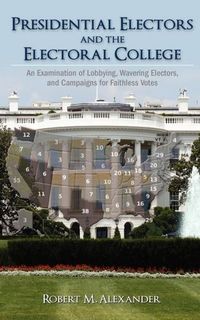

Purchase
Presidential Electors And The Electoral College
Robert M. Alexander
An Examination of Lobbying, Wavering Electors, and Campaigns for Faithless Votes
Cambria Press
February 2012
On Sale: January 28, 2012
224 pages
ISBN: 1604977817
EAN: 9781604977813
Hardcover
Add to Wish List
Non-Fiction Political
This study examines the role of presidential electors in the
presidential selection process. The research conducted here
provides the authoritative treatment detailing who these
anonymous, yet integral political figures are through mail
surveys of presidential electors from the 2000, 2004, and
2008 Electoral Colleges. Examining each of these elections as distinct cases reveals
that a great deal of political activity that has heretofore
gone undetected occurs during the period when citizens cast
their votes for their presidential ticket and the time when
electors cast their vote for their presidential ticket.
Intensive lobbying campaigns aimed to persuade electors to
change their votes have occurred in each of the past three
elections. Moreover, it appears that a potentially receptive
audience exists within this elite political institution.
Surprisingly, not all electors identify themselves as strong
partisans nor do they see themselves as ideologues. Electors
vary sharply in the amount of political and financial
commitment they make to their respective parties and
presidential candidates. Many factors influence the type of
individual who serve as a presidential elector. The context
of a presidential election, how parties select presidential
electors, and a party's presidential ticket account for many
variations among presidential electors. The findings suggest
that presidential electors should be given far more
attention than they currently receive. If past is prologue,
elector lobbying campaigns will persist in future elections
and a significant number of electors will consider joining
the ranks of past "faithless electors" needlessly putting
the Republic at risk. The role of presidential electors is integral to the
presidential selection process, yet virtually no scholarship
exists detailing this important linkage between the
citizenry and America's next president. Surprisingly, no
other book has explicitly investigated these mysterious
figures who translate popular votes to electoral votes. To
undertake this study, the author surveyed members of the
2000, 2004, and 2008 Electoral Colleges to find out who
these individuals were, how they became electors, and what
they thought about the institution. The responses received
were overwhelming—in their profundity and in their
revelations. Over 60% of electors responded to each of the
surveys conducted. This data comprises one of the most
comprehensive treatments of presidential electors ever
assembled. More importantly, the data reveal a significant
risk to the presidential selection process—one that
has not yet been systematically analyzed. The data reveal two completely new findings regarding
presidential elections that have heretofore never been
systematically examined. First, in each of the past three
elections, intensive elector lobbying campaigns have
occurred seeking to persuade electors to vote contrary to
expectations. These campaigns have taken place in the period
between the general election and the time electors cast
their votes in December. Second, and most important, a
significant number of electors actually consider voting for
candidates contrary to expectations. The data reveal that
the presidential selection process is indeed threatened by a
sizable number of potentially faithless or what is termed
here as "wavering" electors. This finding has far reaching
consequences both in the scholarly community and for the
integrity of the presidential selection process. For
instance, in 2004, nearly 10% of presidential electors and
in 2008, over 11% of presidential electors considered voting
for someone other than to whom they were pledged. As a
reference point, this would be analogous to California's
entire delegation considering defecting from their party's
presidential ticket. These findings are completely novel,
unexpected, and alarming. This study should stimulate great
debate among scholars and laymen alike regarding the role of
presidential elector. The Electoral College is already a controversial
institution. Yet, the arguments offered in this study will
likely create much more concern over the way presidents are
selected. The study develops a theory of elector behavior
that takes into account an elector's motivation to "make a
statement against their party," "make a statement against
their party's candidate," or to "make a statement against
electoral practices." The theory and findings are completely
original and have far reaching implications for presidential
elections and the Electoral College. In short, this project
is wholly original, addresses a previously neglected topic,
and reveals a real-world problem that has significant
consequences for American democracy. Presidential Electors and the Electoral College is
an important study for students of the presidency, political
parties, interest groups, institutions, and recent U.S.
history. Party professionals (including electors themselves)
will also be very interested in this book. Finally,
organizations interested in electoral reform (such as Fair
Vote and the National Popular Vote Campaign) will also find
this work to be of great interest.
Comments
No comments posted.
Registered users may leave comments.
Log in or register now!
| 


 © 2003-2024 off-the-edge.net
all rights reserved Privacy Policy
© 2003-2024 off-the-edge.net
all rights reserved Privacy Policy